Whether you realize it or not, there’s a good chance you’re familiar with the tones of a resonator guitar. These unique instruments are the unsung heroes of many famous recordings, and yet, their players are usually more closely associated with a solid body electric model.
If you didn’t know, resonators are a specialist type of guitar that feature a unique amplification cone within their bodies. This helps to project sound further, and increase their volume. At the time of their invention this was necessary, as guitarists sought a way to be heard over louder instruments in their bands.
The cones definitely worked to increase volume, but they also resulted in a much brighter, more metallic tone that stood out from traditional all wood acoustic guitars. So, while resonators were born out of necessity, they have remained popular because their unique sound was so appealing to a wide range of musicians, even after the invention of amplification.
In this KillerGuitarRigs Review, we’ll be taking a look at 5 of the best resonator guitars available today. We’ll be focusing on their construction, their overall quality, their playability, and most importantly their tones.
If you’ve been wanting to learn more about resonators, or dobros as they are otherwise known, you will definitely want to keep on reading.
Read more about our review process.
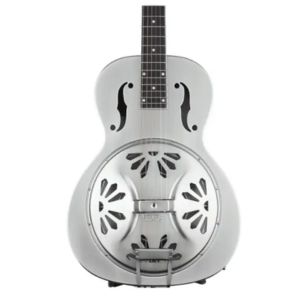
Gretsch G9221 Bobtail Roundneck Resonator
Features: Steel body, Hand spun spider cone, Grover tuners
Benefits: Great tuning stability, Impressive volume, Easy amplification
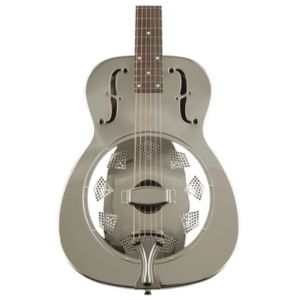
Epiphone Dobro Hound Dog M-14
Features: Bell brass body, Rosewood fretboard, 14 Playable frets
Benefits: Excellent playability, Versatile tones, Huge projection
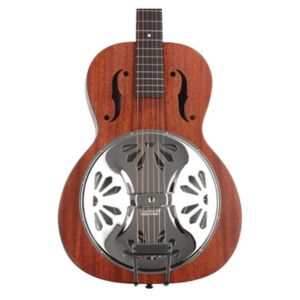
Gretsch G9200 Boxcar Round-neck
Features: Mahogany top, Soft V neck profile, Pearloid headstock
Benefits: Handsome aesthetics, Beautiful vintage tone, Forgiving playability
Contents
Our Top 3
Our Top Pick went to the Epiphone Dobro Hound Dog M-14. This guitar seamlessly blends value for money with performance, making it a good choice for a workhorse guitar. It’s suitable for players of all ability levels, and delivers superb tones and modern playability.
Anybody looking for a bargain resonator that still delivers when it comes to comfort and great tone should check out our Best Budget option, the Gretsch G9200 Boxcar Round Neck. It’s an affordable option with tons of high-end features, and of course that classic resonator sound.
Finally, if you’re in the market for a high-end resonator and you don’t mind spending a bit more, our Editor’s Choice, the Gretsch G9221 Bobtail Roundneck is the guitar for you. It’s packed with premium appointments and sounds amazing both acoustically and when amplified.
Individual Reviews
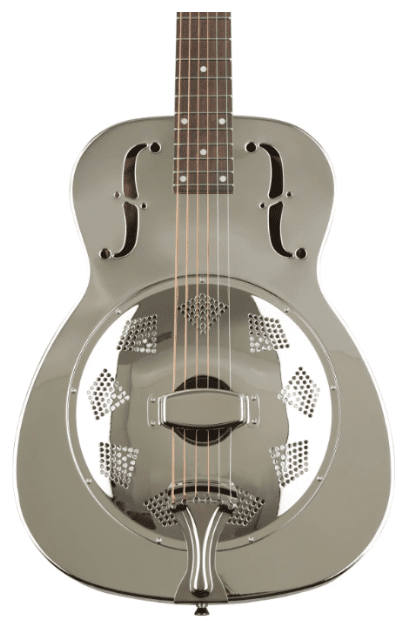
Epiphone Dobro Hound Dog M-14
Classic looks and awesome feel.
With this guitar you're getting a metal body resonator with a fantastic polished nickel finish. It's a great option for players looking to get into a quality dobro from a big name with its comfortable neck, and big voice.
The Epiphone Dobro Hound Dog M-14 is a classic-style metal body resonator. It features traditional F holes and an elegant nickel finish that give it a real vintage vibe.
It has an all brass body and was very nicely built. The neck was made with mahogany and was carved into Epiphone’s fantastic SlimTaper D profile. It was topped with a rosewood fretboard, which looked and felt fantastic. Unlike our Editor’s Choice, the neck wasn’t bound, but this simply added to the rustic ’20s aesthetic. We found the frets to be well-finished with no sharp edges.
We found that the Dobro Hound Dog M-14 had great playability, too. The neck ergonomics were great and we had no difficulty in accessing any of the 14 exposed frets. The setup was good for both chording and slide playing. So again, this model should appeal to a wide range of players.
Tonally speaking, it had a tight, slightly nasal sound with plenty of punch and volume. The brass body gave it an extra helping of brightness, and the biscuit resonator cone funneled the sound back into the body and out of the F holes, providing additional bass to balance out the tones.
As for hardware it was very well equipped, with high-performance Grover Rotomatic tuners. They delivered great tuning stability and made fine-tuning nice and easy.
Verdict: The Epiphone Dobro Hound Dog M-14 is a great choice for anyone looking for a metal body resonator that offers a great blend of price and performance. It packs in all the classic looks and feel of a vintage model, with few modern touches thrown in to ensure top reliability and playability. The tones are punchy, loud, and bright – perfect for blues and country players.
- Comfortable SlimTaper D profile neck
- Rosewood fretboard
- Grover tuners
- Neck is not bound
- Not as loud as spider cone equipped models
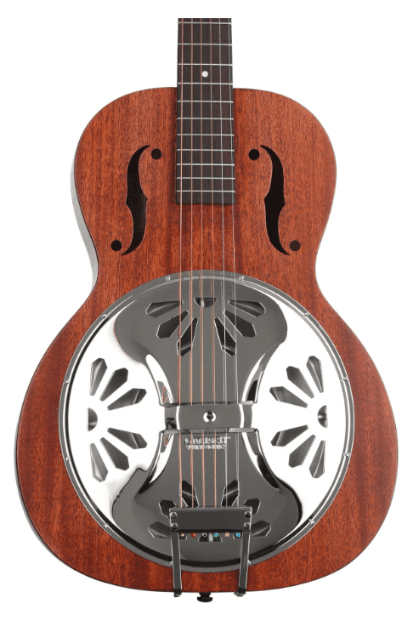
Gretsch G9200 Boxcar Round-neck
A fantastic budget-friendly option.
This is an affordable, yet highly playable resonator guitar. It’s made with a laminated mahogany body and a solid mahogany neck for excellent sustain and resonance, and its hand spun cone delivers impressive projection and volume.
The Gretsch G9200 Boxcar Round Neck is a great option for beginner and intermediate players on a budget.
It’s made with a laminated mahogany body, which gives it both an attractive look as well as excellent sustain and resonance. As for the resonator itself, it had a single-cone hand-spun Easter European biscuit-style unit, which was simple, but very attractive.
The neck was solid mahogany, with a soft V shape profile, which we thought was slick and comfortable, especially for a vintage design. Like the more premium Bobtail, it had a padauk fretboard. Although in this case, it wasn’t bound. Still, we found that the frets were smooth and well-finished from top to bottom with no sharps. And importantly for slide players, proper leveling.
Tones were surprisingly good, too. The combination of the laminated mahogany body and single-cone resonator design delivered a bright, articulate tone that was full of character. We found it to be great for fingerpicking, and also well suited to slide playing.
We found that it held tune extremely well, too. It was also equipped with Grover Sta-Tite open gear tuners, a high-end touch for what is effectively a budget guitar.
Verdict: The Gretsch G9200 Boxcar Round Neck is a great choice for beginners and intermediate players on a budget. It looks and sounds great and offers tons of sustain thanks to its mahogany body. Plus, the Grover tuners ensure solid tuning stability, even when making frequent changes between open and standard tuning.
- Great value for money
- Excellent sustain
- Grover tuners
- Fret work could be better
- Single cone design limits projection and volume.
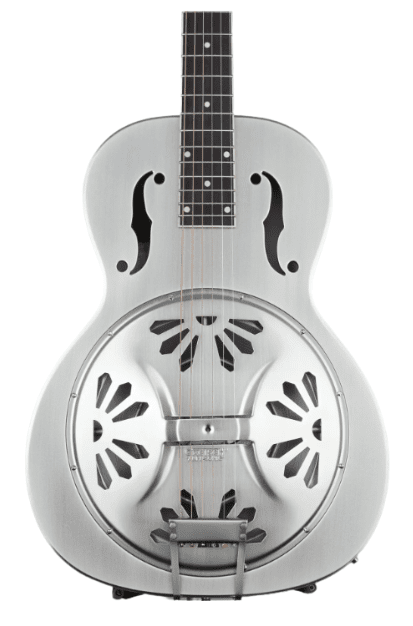
Gretsch G9221 Bobtail Roundneck
Gorgeous vintage tones and fantastic construction quality.
This is a premium steel body resonator that will hold up to even the harshest conditions. The tones out of the box are fantastic, and it will continue to improve with age as the metal body develops its patina.
The Gretsch G9221 Bobtail Roundneck is a premium resonator that is full of high-end, yet tasteful appointments that just ooze vintage charm.
It had an all steel body giving it exceptional brightness, and of course excellent durability. Its spider cone resonator was absolutely beautiful to look at, too.
The neck was made with mahogany and was beautifully set into the body. It had a padauk fretboard, which is a rare wood that is generally considered a good substitute for rosewood. We found that the fretwork was excellent, with well-finished edges and properly leveled and polished crowns. The fretboard was bound, which added to the premium look and feel.
Playability was excellent. The neck was comfortable and the action was set up perfectly for players who switch between slide and standard playing styles.
We found the tones to be incredibly bright, with a super tight midrange. Of course, the steel body added to this, but the driving factor was the Gretsch AmpliSonic Eastern European hand-spun spider cone and bridge. It gave it a loud, airy tone that really stood out, and because spider cones project outwards away from the guitar rather than into the body, it projected exceptionally well.
The tuners performed brilliantly, too. It was fitted with Grover Sta-Tite open gear units that held firm, and looked fantastic in the process. It was also equipped with a Fishman Nashville pickup system, which uses a piezo style ceramic pickup. We found that it reproduced the organic tones of the guitar brilliantly.
Verdict: The Gretsch G9221 Bobtail Roundneck is a fantastic resonator for serious players. It delivers authentic blues tones that really take you back to the 1930s. It had tons of punch and plenty of volume. And thanks to the built-in pickup, it’s stage and studio ready, too.
- Fishman pickup
- Grover tuners
- Excellent Projection
- Neck heel impedes upper fret access
- We expected a rosewood fretboard at this price
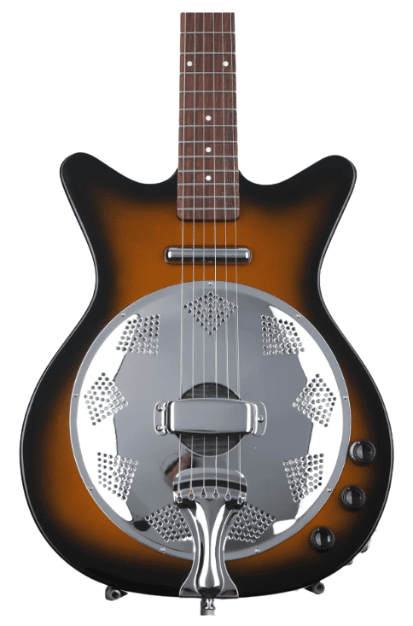
Danelectro ’59 Resonator
Real '50s mojo and top amplified performance.
This guitar is a unique looking resonator, but still a solid all-rounder, offering exceptional value for money. It's made with a hardboard/plywood body, and a single biscuit cone. It's a great option for those who prefer to play plugged in, thanks to its combination of electromagnetic and piezo pickups, and if you're into '50s styling, it doesn't get much more authentic than this.
The Danelectro ’59 Resonator has a solid hardboard/plywood body, which was finished in an attractive sunburst. Unlike the other guitars on test, it looked and felt more like an electric guitar, with its double cutaway shape and thin body. This isn’t going to appeal to purists, but if you want maximum playability while still getting resonator tones, it’s a good option.
The neck had a comfortable C-shaped profile with a 21-fret pau ferro fretboard. We did find that the heel of the neck was a little obtrusive when trying to access the upper area of the fretboard, though. On the topic of frets, we found them to be nice and smooth, and properly leveled with no sharps.
When played acoustically, we found this Danelectro to be a little weak. The thin body killed a lot of the resonance and without that vibration, a lot of the benefits of a resonator are lost. Fortunately, there was a biscuit cone mounted piezo which allowed us to amplify the resonator tones. Played through an amp, we really liked the way it sounded. It was bright with some midrange bite and tons of sparkle. Played through the ’59 lipstick pickup, it served up some fantastic vintage rhythm tones.
It was fitted with Kluson-style vintage tuners and thankfully they performed well. It was a reliable guitar with good intonation, and was relatively easy to fine-tune.
Verdict: The Danelectro ’59 Resonator is aimed squarely at the intermediate to advanced player who wants a bit of vintage style and tone, but doesn’t want to sacrifice reliability or comfort. It looks great and sounds fantastic, especially when plugged in. It offers a blend of resonator and electromagnetic pickup tones, giving it tons of tonal versatility and making it a useful tool for stage and studio use.
- Unique looks and tones
- Blend of resonator and electromagnetic pickups
- Stable tuning
- Weak acoustic tone
- Heel may interfere with upper fret access.
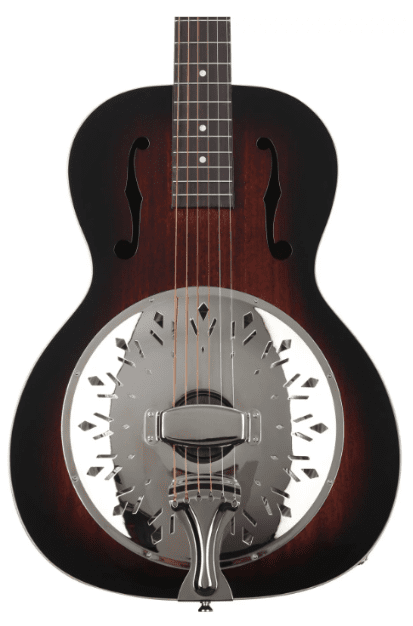
Recording King Rattlesnake Resonator
A robust, reliable and great sounding wood body resonator.
With this guitar you're getting authentic prohibition era looks and tones, with high end build quality and excellent playability. It's a great all-rounder with a strong acoustic and amplified tones, and it makes the perfect delta blues porch strummer.
The Recording King Rattlesnake Resonator features a mahogany top with mahogany back and sides, finished in an attractive gloss sunburst. It was equipped with a single hand-spun European resonator, with a subtle, yet attractive design. The body was one of the slimmest on test, which did help a lot with overall comfort.
Its neck was carved into a thin to medium C-shape profile, which we found to be fairly easy playing. This was yet another model with a padauk fretboard. Despite the relative obscurity of the wood, we still found that it looked and felt good under the fingers. The frets were nicely finished, too – well polished and with no sharp edges.
Acoustic tones were great, with plenty of low-end thump and a nice amount of sparkle at the top end. It was quite apparent, however, that the volume was stifled a little by how thin the body was. One thing that did help the volume, however, was being able to plug into an amp courtesy of the built-in Fishman Nashville electronics.
When played through an amp, we found it to be really responsive to different playing styles. Played clean, it had plenty of character and kept its articulation. With the gain cranked, we really got some nasty blues tones out of this guitar.
Verdict: The Recording King Rattlesnake Resonator is a fantastic all-rounder that has been designed to evoke old school resonator blues tones with modern playability. It looks great, plays well, and sounds even better when plugged in. This is a guitar for everybody from the front porch guitarist to the serious blues player looking for a truly authentic vintage sound.
- Excellent playability
- Good build quality
- Fishman Nashville pickup
- Quiet when played acoustically
- Padauk fretboard may not be to everyone's taste.
How to Choose the Right Guitar for You
Resonator guitars definitely have a following within certain subsets of guitarists, but they aren’t as popular as they once were thanks to easy access to quality amplification. If you’d like to learn a little more about what to look for, be sure to read our buyer’s guide.
History of the Resonator Guitar
The resonator guitar was invented in the 1920s by John Dopyera, a luthier and inventor who wanted to create an instrument that could produce louder and clearer sounds than traditional acoustic guitars. These instruments quickly became popular with blues, country, and folk musicians of the era.
In the 1930s, several manufacturers began producing their own resonator guitars, including National and Epiphone. By the 1950s, resonator guitars were produced in a number of different styles, with both metal and wooden bodies.
Today, resonator guitars are still widely used by a broad range of musicians including blues, country folk, and even rock players.
How Do Resonator Guitars Work?
Resonator guitars use a metal cone or “resonator” to amplify sound. This cone is usually made of aluminum, brass or steel and is attached to the guitar’s body. When the strings are plucked, the vibration is transferred to the resonator, which amplifies the sound into the body of the guitar, where it resonates and then projects it out of the guitar’s sound hole(s). This makes resonator guitars louder and brighter than traditional acoustic guitars.
The one exception to the rule is with spider resonators, which detect the string vibrations, but push them back out of the guitar like a loudspeaker. These models have less sustain, but noticeably more volume.
In addition to more volume, the resonator also helps to create a unique tone that is often compared to banjos or mandolins because of the metallic “twang” they produce.
What’s the Difference Between a Flat Neck Resonator and a Round Neck Resonator?
There are two main types of resonator guitars: square neck and round neck, with the primary difference being the method in which the guitar is played.
Square Neck
The neck of a square neck resonator is straight and the strings are usually tuned to an open tuning, such as Open G or Open D. Square necks often have fret markers, but no actual frets, and are set up with extreme nut height. This makes their actions so high that it’s really only possible to play them with a slide.
Round Neck
Round neck resonators have lower actions that allow for different styles of playing, including fingerpicking and strumming, and are in effect, just like a standard guitar played in the Spanish style. These resonators are usually tuned to standard tuning, but can be changed to alternate tunings like Open G or Open D, especially if you want to play slide. Subsequently, they are a little more versatile than square necks.
Metal Body vs Wood Body Resonators
Wood Body
Wood body resonator guitars tend to have a warmer sound with more sustain and resonance. They are typically lighter in weight, and are often less expensive. Mahogany is a typical tone wood when it comes to resonator construction thanks to its balanced tonal profile and excellent resonance.
Metal Body
Metal body resonators are usually made from steel or brass. Steel body instruments tend to be the brighter sounding guitars, but they lack sustain and depth of tone. Brass body resonators are a little warmer and sweeter sounding, and they gain back some resonance, but the top-end shimmer is noticeably lessened compared to steel.
Types of Resonator
There are three types of resonator cones used in guitars: single-cone, tricone, and spider cone.
Single (Biscuit) Cone
The single-cone resonator is amongst the oldest types of resonator and is typically made from aluminum or brass. It has a simple design and is the most common type of resonator cone. This type of cone feeds vibrations back into the body of the guitar, where they continue to “resonate” before sound escapes from the F holes or other sound hole arrangement on the guitar’s top.
Tricone
The tricone resonator was developed by John Dopyera in 1926 and features three metal cones instead of one. This design offers increased volume and clarity over standard single cone, or biscuit, resonators and is often used in higher-end resonator guitars.
Spider Cone
The spider cone resonator was also developed by John Dopyera in the late 1920s (although this does remain disputed). It features a metal spider-like structure inside the cone that helps to amplify sound. Unlike other cones, it projects vibrations outwards, rather than inwards into the body, and acts more like a speaker cone.
Final Thoughts
Owning a resonator is a dream for many simply because they sound so vastly different to standard acoustics. Players might argue back and forth all day about how different mahogany and rosewood sound, but there’s no denying the difference when a resonator cone is added to the mix.
To recap our favorites, our Top Pick was the Epiphone Dobro Hound Dog M-14. It was handsome and sounded amazing, all while coming in at a reasonable price point. Our Best Budget option, the Gretsch G9200 Boxcar Round Neck delivered big on performance, all while having the least impact on the wallet. Finally our favorite, our Editor’s Choice was the Gretsch G9221 Bobtail. It served up amazing vintage tone and still managed to play modern styles while keeping its composure. It had a phenomenal electronics setup and was truly an excellent guitar worthy of anybody’s consideration.


